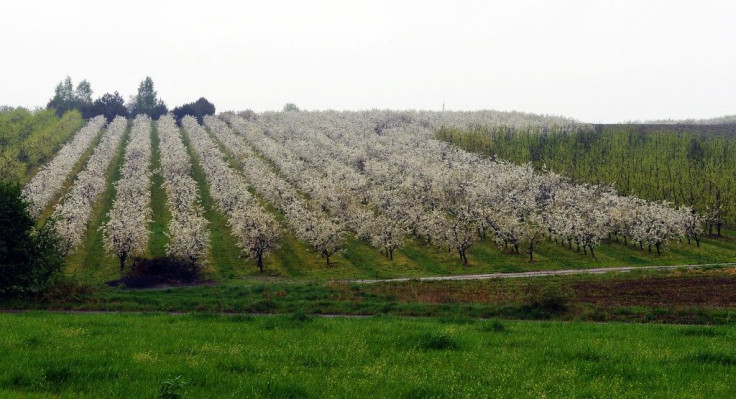Polish Farms Hit With One-two Punch Of Virus, Drought

Poland's farmers have already been hit hard by the coronavirus pandemic, which has deprived them of seasonal workers from Ukraine. Now, an unprecedented drought is making things even worse.
"Everyone's panicking. We don't know what's going to happen to us," Adrianna Bukowska-Lazarska, whose farm usually produces more than 300 tonnes of strawberries per year near the central village of Czerwinsk nad Wisla, told AFP.
Agriculture Minister Jan Krzysztof Ardanowski has warned that the drought could hurt food production, implying that while there is no risk of a shortage, prices may very well go up.
President Andrzej Duda has also expressed concern, calling on residents on Wednesday to be reasonable with their water use.
"We haven't seen water levels this low since we began recording them a century ago," said Grzegorz Walijewski, spokesman for Poland's IMGW weather institute.
"The same goes for flow rates. It's never been this bad," he told AFP, adding that forecasts for the next couple of months are not looking good either.
Poland is no stranger to droughts, but the phenomenon is getting worse.
The EU member's Supreme Audit Office (NIK) warned last year that already only 1,600 cubic metres of water is available for each Pole per year.
"Our (water) resources are comparable to those of Egypt," the office said in a report bearing the ominous title "Poland, European Desert."
The drought has aggravated huge fires ravaging Poland's largest nature reserve, the Biebrza National Park in the country's northeast.
The extent of the problem is also visible in Warsaw: sandbanks normally hidden a couple of metres (six feet) underwater have emerged out of the Vistula, Poland's largest and longest river.
Its water level has sunk to 60 centimetres (24 inches), according to official measurements.
"We had no snow this winter. Now there's no rain. We need a week's worth of light rain -- not a heavy downpour, where the water disappears quickly without penetrating the soil," said Marian Sikora, president of the Polish Federation of Agricultural Producers.
"The ground is dry. You have to dig a 15-centimetre hole to find moisture," he told AFP.
Bukowska-Lazarska's strawberries are safe for now, thanks to a sophisticated watering system fed by a deep well that she had installed.
"But my costs have doubled. You need power to work the pumps, and also to filter and heat up the water, which is too cold."
Though watering systems have kept strawberries and raspberries growing well, Bukowska-Lazarska says it is up in the air whether they will be harvested.
For years now, that has been the job of seasonal workers from Ukraine and Belarus. But given the border closures and quarantine measures introduced in response to the coronavirus pandemic, fewer of them are expected to arrive in Poland this year.
In both 2018 and 2019, around 60,000 Ukrainians worked in the Polish farming sector, according to official figures from the EU member's agricultural ministry.
Despite the pandemic, Warsaw has kept its borders open to Ukrainians, but Bukowska-Lazarska fears "they'll be scared to come" this year.
They would be separated from their families and could get sick. They could also be placed in quarantine for two weeks without being able to work -- something they would not have to worry about in Germany for example.
She requires around 50 workers, who would normally begin working in around two or three weeks to prepare for the strawberry harvest, followed by the raspberry harvest in June.
As if that were not enough, Bukowska-Lazarska has one more obstacle standing in her way: fake news.
"We've been hearing people say we'll have to wash the strawberries in warm water to rid them of the virus. They wouldn't be able to handle that. We'd have to make compote out of them," she said.
The rumours are false, the health ministry told AFP, quoting the European Food Safety Authority, which said last month regarding the virus that there is "no evidence that food is a source or transmission route."
© Copyright AFP 2024. All rights reserved.





















